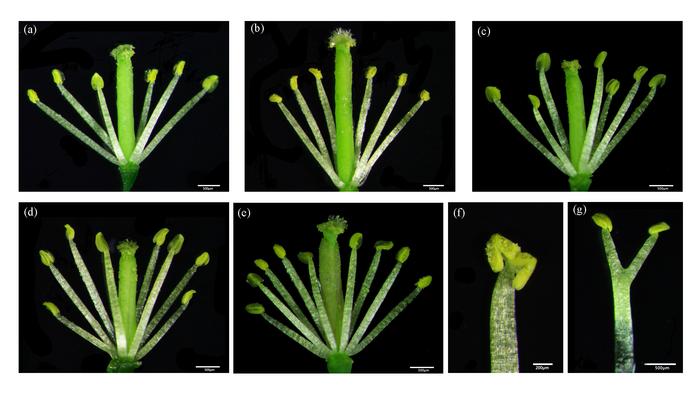
image: Floral characteristics of A. thaliana wild type (a) and transgenic plants (bg).
visualization Moreover
Credit: Horticultural Research
Labile expression of sex has been frequently reported by empirical observation in a variety of People species, but the underlying genetic mechanism remains largely unknown.
This article was originally posted on Horticultural research with title: The proposed role of MSL-lncRNAs in causing sexual lability of female poplars.
In this study, we conducted a systematic study of a gene that promotes masculinity, MSL extensiondetected in Populus deltoids genome. Our results showed that both strands of MSL extension multiple content Are you there-activating elements, which generated long non-coding RNAs (lncRNAs) that promote masculinity. Even if female P. deltoids it was not masculine specific MSL extension gene, a large number of partial sequences with high sequence similarity to this gene were detected in the genomes of a sequenced poplar variety. Based on sequence alignment, the MSL extension sequence could be divided into three partial sequences and heterologous expression of these partial sequences in Arabidopsis confirmed that they could promote masculinity. In contrast to the tetradynamic (four long and two short) stamens of wildflowers, we have observed flowers with six long stamens, seven or eight or nine stamens, or stamens bearing two anthers, or branching stamens in transformed lines (FIG. 3). Based on the effect of MSL extension sequences on the development of androecia observed in this study, we have proposed a molecular model that triggers sexual lability in female poplars (FIG. 4). In this model, the activated transcription of MSL extension homologous sequences only lead to female lability, but do not cause male lability.
Our Study The results of this study showed that the activated transcript the MSL extension homologous sequences could promote masculinity in heterologous expressed Arabidopsis. If these promoters of masculinity were expressed in female poplars, they would lead to female lability. This study provided a unique perspective to better understand female sexual lability in poplars.
###
References
Authors
Jinyan Mao1#Suyun Wei1#Yingnan Chen1Yonghuayang2Tonming Yin1*
Affiliations
1 State Key Laboratory for Tree Genetics and Breeding, Co-Innovation Center for Sustainable Forestry in Southern China, Key Laboratory of Tree Genetics and Biotechnology of Education Department of China, Key Laboratory of Tree Genetics and Breeding of Jiangsu Province, Nanjing Forestry University, Nanjing , 210037, China
2 Institute for Plant Molecular Biology, State Key Laboratory of Pharmaceutical Biotechnology, School of Life Sciences, Nanjing University, Nanjing 210023, China
From Tonming Yin
Tongming Yin, a professor at Nanjing Forestry University, was born in February 1970. Research fields including forest tree genetic breeding, molecular genetics, forest genome and bioinformatics. The articles have been published in important international and national journals such as Science, Nature, Nature Communications, New phytologist, plant journal, plant physiology, genome research, horticulture researchetc.
magazine
Horticultural research
Research method
Experimental study
Research object
Not applicable
Article title
The proposed role of MSL-lncRNAs in causing sexual lability of female poplars.
Article publication date
March 13, 2023
COI statement
The authors declare that they have no interests at stake.
Disclaimer: AAAS and EurekAlert! are not responsible for the accuracy of the press releases posted on EurekAlert! by taxpayer agencies or for the use of any information through the EurekAlert system.
#Professor #Tongming #Yins #team #Nanjing #Forestry #Universitys #State #Key #Laboratory #Tree #Genetics #Breeding #proposed #role #MSLlncRNAs #causing #sexual #lability #female #poplars
Image Source : www.eurekalert.org
